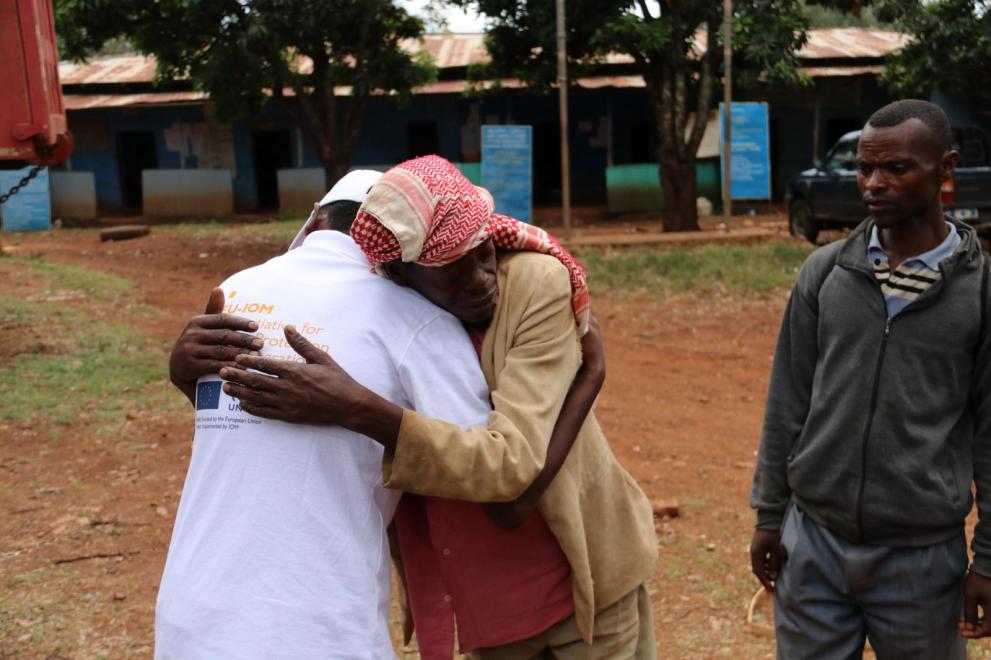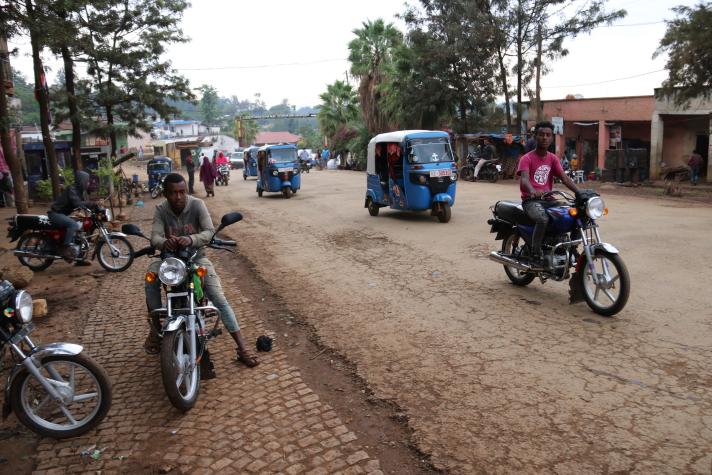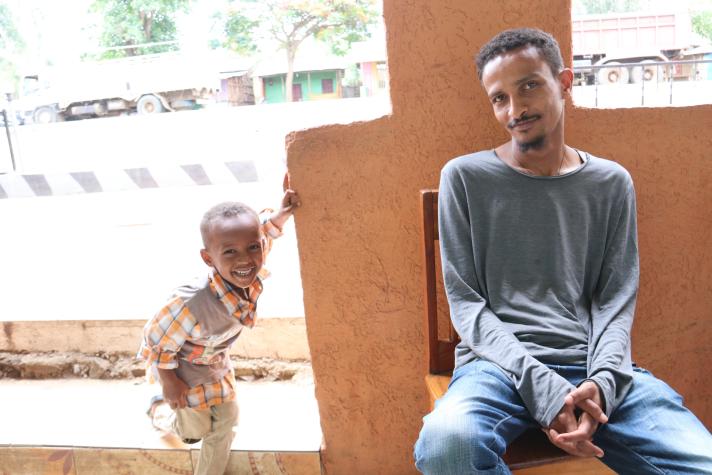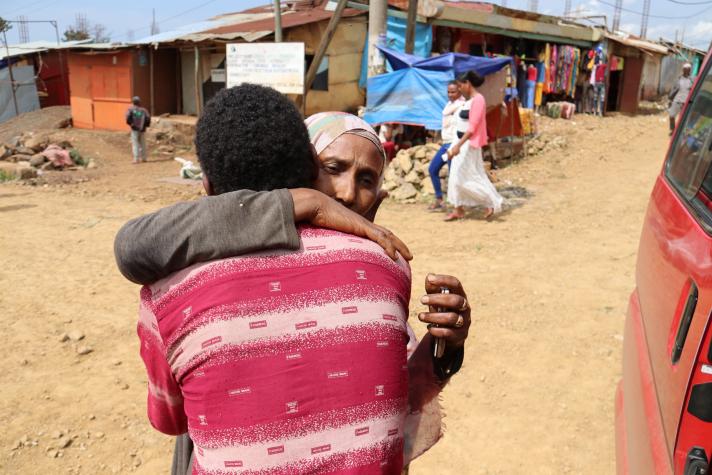
*By Wilson Johwa, Regional Communications Officer at IOM’s Regional Office for East and Horn of Africa in Nairobi
We set off early from Addis Ababa, on a mission to reunite unaccompanied minors with their families.
All of them are irregular migrants, teenagers, who have voluntarily returned to Ethiopia, their country of origin.
Ethiopia, with a population of over 100 million people, accounts for the largest movements of irregular migrants in the Horn of Africa. Most of these are young, from rural communities and are early school dropouts. Unaccompanied minors are some of the most vulnerable migrants and are always attended by a social worker on re-unification missions. The International Organization for Migration (IOM) takes them home, often more than a day's ride from the capital.
The EU-IOM Joint Initiative for Migrant Protection and Reintegration in the Horn of Africa (the Joint Initiative), launched in December 2016 with funding from the EU Emergency Trust Fund for Africa (EUTF), is the first comprehensive programme of its kind to save lives, protect and assist migrants along key migration routes in Africa. One of its key roles is to facilitate returns.
Today's journey is happening with the support of the Ministry of Women Children and Youth (Bowca), in line with the working arrangement between IOM, UNICEF and Bowca. Bowca's social workers, like Kasahun Worku, help conduct family tracing. For four years Worku’s work has centred on assisting returning migrants, including finding and reaching out to the legal guardians of the returnees. Family tracing usually takes between seven and ten days. “It’s not easy. Sometimes the phone numbers do no longer work” he says.
Two of the boys we are taking home today came from Djibouti — the main transit country traversed by Ethiopian migrants aiming to reach Yemen and then Saudi Arabia — while one has returned from conflict-ridden Yemen. As we travel by road through the country, the boys share their stories.
Yusuf (17)
We are in Oromia, the largest region in the country, where one can experience rural Ethiopia. Many here take the decision to emigrate. Livestock — mainly cows and goats — cross the busy highway with much more frequency than humans. There are also motorbikes and the ubiquitous three-wheelers, known locally as ‘bajaj’ —the main mean of local transportation and also the most popular local business, in addition to restaurants and coffee stands.
Yusuf hugs his mother, Bultu, who cannot hold back her tears when they reunite. It has been two months since they last saw each other. “We’re living in extreme poverty. I took it (his emigration) as a solution to our situation,” Bultu says. When her 17-year-old son left home, she was the only one who knew he was leaving.
Bultu has three other children, all girls. She’s is the family's breadwinner. Her husband has tuberculosis and cannot work. The family has no farmland. All they have is the patch of land where their house stands. The little money they get comes from the sale of khat, a stimulant plant.
Yusuf's three sisters are not in school. She fears that, if left idle, Yusuf will try to leave again.
“I am so happy he came back safely but I still have the same problem: What will I do for him? I don’t want him to try to emigrate again. I want him to go back to school”, Bultu says.
Yusuf says he experienced a lot of hardship in the two months that he was away, such as hunger and sleeping rough. “I am very disappointed to be back without achieving my goal,” he says. “I want to be involved in a trade but I have nothing to get me started…If I can get this, I can change my life and my family’s prospects.”
Sara Basha, the coordinator of the Joint Initiative in Ethiopia, explains that re-integration support starts with post-arrival assistance offered to returnees at the Transit Centre. People are provided with temporary accommodation, hot meals, general medical screening, psychosocial counselling and specialized medical follow-up for those with specific medical needs. Family tracing also happens at the Transit Centre with the support of social workers — like Worku — assigned by the government.
Misganu Guddina, the protection officer from Bowca overseeing the reunion, says the district receives many returnees, mostly from Yemen, Saudi Arabia and Djibouti. Not all are able to receive financial assistance, as the resources are limited.
The preferred form to re-integrate minors is to enrol them back in school. "However, it is often difficult to convince returnees between 14 and 18 years to go back to school. A lot of them drop out of school even before they migrate and are not interested in going back,” Basha says. In Ethiopia, adolescents aged 14 years and above can engage in economic activities. Hence, going back to school is not always the most desired option.
Nazimo (17)
Nazimo, along with several peers from his neighbourhood, went to Djibouti with the intention of reaching Yemen. He agreed to help a smugglers’ network, assured that he would be assisted in his journey. But along the way, after having paid money to get into Djibouti, his group was abandoned by the smuggler.
Nazimo says he got as far as he did by selling his mother’s cow, without her permission. Now his dream is to pursue an education and also assist his mom, a widow.
Sali (16)
Sali made it to Yemen, by being passed on from smuggler to smuggler, hidden away at the back of a truck and working in villages in exchange for food.
Once in Yemen, Sali soon decided to return home due to the extreme conditions he faced. His 14-year-old brother, with whom he had travelled, is still in Yemen.
Sali's plan is to resume his education. But since school is several kilometres away, he wants to work and earn money to buy a motorbike, which will help him commute and earn additional money.
We leave him in the care of his aunt as it turns out that his father now lives elsewhere with a new wife and a young family.
“We tell them to teach their neighbours about their suffering away from home, and to be strong in working to show us that they can change their lives in their country,” says Guddina.
Fanose Degefa, Head of the women and child protection office, says that youth in her area is forced to emigrate due to poverty, single-parent households with several children — like Sali’s — and peer pressure.
"The biggest pull factor for migrants is to know that someone from their neighbourhood has made it", Kasahun Worku says. “The main reason for migration in Ethiopia is financial problems. If these can’t be solved, they will re-emigrate,” he says.
As of July 2019, 5,312 returnees assisted by the Joint Initiative in Ethiopia. The EUTF in the Horn of Africa implements several projects in Ethiopia to create jobs, support income generating activities and improve basic services. So far, thanks to the EUTF, over 9,400 jobs have been created in Ethiopia, more than 22,000 of the most vulnerable people have been assisted to develop income generating activities, and almost 2 million people have better access to basic services.
Details
- Publication date
- 17 September 2019
- Region and Country
- Ethiopia
- Thematic
- Improved migration management
- Partner
- International Organization for Migration



